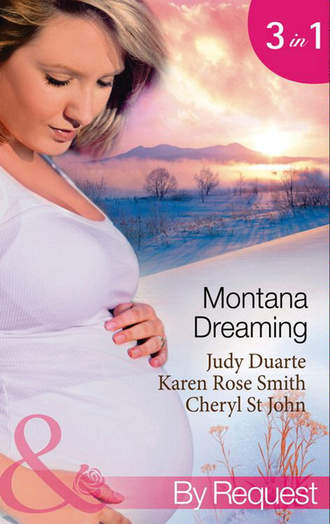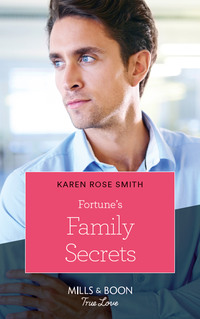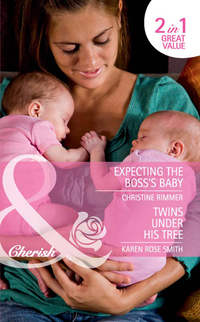
Полная версия
Montana Dreaming: Their Unexpected Family / Cabin Fever / Million-Dollar Makeover
The doctor made a note in the chart, then glanced at Juliet. “If you promise to stay off your feet, I’ll let you go home.”
“That’s great.” Juliet knew she’d feel better in the privacy of her own little apartment, close to her photographs and memories. “Thank you.”
“But I’m talking extreme bed rest,” the doctor stressed.
Mark cleared his throat. “Juliet doesn’t have anyone to look after her, so maybe she ought to stay here.”
For several weeks? Was he crazy? “That’s ridiculous, Mark. I’ll rest better and be happier at home.”
Dr. Hart glanced up from the chart. “I’m not sure how your insurance carrier will feel about you staying here for more than a day or so. Do you have someone who can stay with you?”
“No, I live alone. But I promise to take it easy.”
“Oh, yeah?” Mark made his way to Juliet’s bedside. He’d seen the way she’d been “taking it easy” at The Hitching Post. “Doctor, you can’t trust her not to get up and do the dishes or scrub floors or clean out closets or something like that.”
“Then maybe we’d better keep you here.” Dr. Hart, attractive even in green hospital scrubs, leaned her hip against the bed and crossed her arms.
Disappointment swept over Juliet’s face, and Mark felt like a real spoilsport. But she didn’t have anyone to look after her. He doubted Mrs. Tasker, who liked to park her butt by the cash register, would volunteer to help.
Juliet looked at him and frowned, tossing a guilt trip on him.
Mark supposed he could check on her. After all he was staying across the street.
“I can look after her.” The comment popped out before Mark could think about the ramifications. And when Juliet and the doctor faced him, he realized backpedaling would be next to impossible now. He was committed. And he’d taken a stand. But that didn’t mean his gut wasn’t twisting.
Juliet shot him a wide-eyed stare. “You can’t be serious about staying with me.”
“Why not?” The question couldn’t have surprised her any more than it had him. Hell, Mark had not only volunteered to babysit a woman who was on the verge of going into labor, but now he was trying to convince her—and maybe even himself—that it was a good idea.
“You can’t waste your time taking care of me.” Juliet pressed the control button that raised her up in bed. “You’ve got work to do.”
He shook his head. “I don’t have anything pressing to do.”
“That’s not true,” she countered. “You’ve got a news article to write.”
“The story, as I’ve told you before, is a joke. And the article can practically write itself.”
“So, what’s the verdict,” Dr. Hart asked. “Do I sign these release papers or not?”
Mark crossed his arms. “Sign them.”
“All right,” the doctor said. “I’ll have the paperwork processed. Then I’ll send an orderly to take you out in a wheelchair.”
When Dr. Hart left the room, Mark ran a hand through his hair. Juliet’s back might feel much better this morning, but his hurt like hell.
What he really needed to do was get out of here, shower and maybe take a nap.
He glanced at Juliet and saw reluctance in her expression. Resentment, too? He wasn’t sure. But she’d been overruled, and he had a feeling it didn’t sit well.
Strangely, for a guy who liked to come out on top himself, he wasn’t feeling too happy about winning this argument.
And he hoped to hell he hadn’t bitten off more than he could chew.
Thirty minutes later, Mark brought his rental car to the curb at the main entrance of the hospital. Then he helped Juliet into the passenger seat.
He was taking her home. And that fact brought on a flurry of other concerns, things he hadn’t considered when he’d volunteered to look after her.
There was no way around it. He would have to put in a significant amount of time with her. He’d told the doctor he’d take care of her, not pop in and out several times a day.
What if something went wrong in the middle of the night?
He’d have to stay there until she was no longer at risk for premature labor.
But how big was her place?
Where would he sleep?
On the sofa, he supposed.
The crick in his back, the one he’d woken up with, ached all the more, just thinking about being camped on her sofa for the next week or so. Damn. He was going to have to see a chiropractor when this stint in Thunder Canyon was over.
As they drove past the newly constructed Ranch View Estates, Juliet peered out the window, studying the pine tree-lined entrance, the bright, colorful flags and a sign announcing that Phase I was now available.
“That’s a nice housing development,” she said. “One afternoon, on my day off, I looked at the models.”
Mark nodded, but didn’t comment. He didn’t have any inclination to set down roots, to purchase a home and landscape a yard. Especially not in Thunder Canyon.
At thirty-eight, he’d yet to buy a place of his own. And why should he? He was always off on assignment, living in hotels that the news service paid for.
He turned left onto Main and followed it until they neared The Hitching Post.
“Can you drive around to the rear entrance?” Juliet asked. “I don’t feel like going through the dining room looking like this.”
“Sure.” He didn’t think she looked bad at all, not after what she’d been through. But he didn’t argue. He swung around to the back, where a black Chevy S-10 pickup with a vinyl cover on the bed was parked next to a trash bin.
Mark nodded toward the custom truck with a lowered chassis. “Whose is that?”
“It’s mine.”
“You drive a pickup?” He chuckled. The lady was full of surprises. “Somehow, I figured you would drive a racy red sports car or a flashy white convertible.”
“Hey, that little truck is special to me. It was my brother’s pride and joy.”
Was?
She’d told him the baby was her only family.
Unable to quell his curiosity, he asked, “What happened to him?”
“He died about eighteen months ago, and since he’d listed me on the title, I inherited his truck.”
“I’m sorry,” Mark said, the words feeling inadequate but necessary.
“I’m sorry, too.”
A heavy silence filled the interior of the car, and Mark wanted it to end, wanted to lighten the mood. To make her feel better. But it was hard to know what to say to someone who’d lost a loved one. He knew how impotent sympathetic words could be. No one had been able to ease his grief after his sister died. Not when her death had been his fault.
His parents had never forgiven him for what had happened that stormy evening. But he supposed that was to be expected. He’d never forgiven himself, either.
“It’s tough not having a family,” Juliet said, breaking the stifling stillness that had nearly choked the air out of the sedan. “But I focus on the memories we had. It’s what Father Tomas, our parish priest, advised me to do. And it helps.”
Mark was glad she had memories to rely on. He didn’t. At least not the kind that made him feel better. In a way, he’d lost his entire family, too, even though his parents were still alive and kicking.
When his mom had learned he was in town, she’d called him at the Wander-On Inn. She’d sounded hurt that he hadn’t chosen to stay at the motel she and his dad had owned and operated for the past twenty-five years.
Mark had told her it was because the company had prepaid his room without knowing his family could provide him free lodging. But to be honest, Mark had been very specific with the company’s travel agent when they’d talked about where he wanted to stay—anywhere but The Big Sky Motel at the edge of town.
After parking beside Juliet’s pickup, he spotted the stairway that led to the second floor.
He supposed he shouldn’t be surprised that The Hitching Post didn’t have an elevator, not when the county land office was just beginning to convert their records to a computer system. He bit back a swear word, but couldn’t stop the grumble that slipped out.
“What’s the matter?” she asked.
“I’m going to have to get you upstairs.”
She opened her mouth, as if to object, then closed it again. Apparently, the recent bout of premature labor had made her realize how vulnerable she was.
He slid out of the driver’s seat, circled the car and opened her door, intent upon carrying her.
She put her hand up to stop him. “Maybe if I take the steps really slow—”
He shook his head. “No way. Climbing stairs isn’t a good idea. It’s too strenuous.”
“I can’t let you carry me.” She glanced down at her belly and frowned. “I’m too heavy.”
She might be pregnant, but she was a petite woman. Small boned.
“Don’t be silly. You’re a lightweight.”
“Open your eyes, Mark.” She stroked her stomach.
Heck. Women could be so testy about their weight—even when they weren’t pregnant. As he opened his mouth to argue, he caught a glimpse of skepticism in her frown.
Hey, wait a minute. Was she doubting his ability to carry her?
His male pride bristled. “Listen, sweetheart. I’m probably ten to fifteen years older than you, but that doesn’t make me over the hill yet.”
She balked momentarily, as though contemplating a fight, but she slipped an arm through the shoulder strap of her purse, swung her legs over the side of the seat, draped a hand around his neck and let him scoop her up.
She was heavier than he’d expected, but she was all belly. How big was the kid?
As he lifted her from the rented sedan, he choked back any sound she might consider a winded effort. But once he’d straightened and kicked the passenger door shut, it wasn’t so bad. In fact, he kind of liked holding her in his arms and feeling like some kind of kick-ass hero.
Her arm looped around his neck. Holding on. Holding him.
He carried her up the steps, nails in the wood creaking under their combined weight. Damn, he hoped that whoever had built this stairway had made it sturdy. And that it hadn’t been the original staircase. No telling what more than a hundred years of wear and tear had done to the structure.
“Mark, wait. I’m really uneasy. That can’t be good for the baby, either.”
She was right. He let her down, then helped her walk the rest of the way. Slowly. Carefully. Step by step.
When they reached the top landing, she dug through her purse for the key, but instead of unlocking the door, she turned to him instead. Her belly brushed against him, tempting him to touch it. To see what it felt like. But he refrained.
Her eyes sparked with sincerity. “I can stay alone. Really. Maybe, if I give you a key, you can stop in and check on me several times a day.”
The idea had merit. But Mark had promised the doctor he’d look after her. And that’s what he intended to do. “If it’s okay, I can stay with you. Besides, I’m stuck in town anyway—at least until the county clerk returns and I can have a look at those old recorded deeds.”
Her eyes widened and her lips parted. “Are you going to move into my place?”
No. He couldn’t do that. Ever since his wife had left him and filed for divorce—way back when—Mark had learned to protect himself, his freedom. His secrets.
Even when he was seriously dating someone, he’d maintained a distance. He didn’t like the idea of having his toothbrush and razor claim space on someone else’s bathroom counter or on a shelf inside a medicine cabinet. Unless, of course, it was in a hotel room on a lover’s getaway weekend.
But this was different.
Still, he couldn’t bring himself to check out of the inn completely. It wasn’t a matter of saving money. It was saving his space. His privacy. His ability to slip away before things got complicated.
“No, I’m keeping the room at the inn.” As an explanation, he added, “With all the fortune hunters who’ve clamored into town, rooms are limited. And if I give up my place across the street, I might not be able to find another one.”
And that was true. Mark sure as hell wouldn’t ask his folks if he could stay with them. Not at the small mountaintop home they owned. Not even on a couch in the office of The Big Sky Motel.
“If you’ll be okay for a while,” he said, “I’ll go across the street and bring over a few personal items. A change of clothes.”
She flashed him a battle-weary but confident smile. “I’ll be fine. Remember, I’m the one who wanted to stay alone.”
He nodded, waiting as she turned her back and slipped the key in the lock. After she opened the door, he followed her inside.
The scent of cleaning products mingled with a hint of paint, as he entered a living room that didn’t have any walls separating it from the kitchen or dining area. He glanced around, eyes adjusting to the darkened interior.
She flipped on a switch, turning on a goofy wagon wheel chandelier that lit the room, revealing a brown tweed sofa, a black recliner and a maple coffee table.
A trace of old cigarette smoke that a good scrubbing and a paint job hadn’t been able to hide lingered in the gold drapes and the green shag carpet.
“Why don’t you lie down,” he said. “I’ll be right back.”
As he turned to go, she grabbed the sleeve of his shirt, those rich mahogany eyes snaring his, setting his nerves on edge, making his heart rumble in his chest.
“Thanks…for…you know…” She gave a little shrug. “For everything.”
“No problem.” But as he stepped into the crisp, cool morning air, he wasn’t so sure he’d done anything commendable.
Juliet wasn’t in a hospital—where she belonged.
And Mark, who had volunteered to be her private duty nurse, didn’t know squat about pregnant women, childbirth or babies.
What in the hell had he set himself up for?
Juliet stretched out on the sofa, her head propped up on two pillows. As she thumbed through a Parents magazine, a knock sounded at the door.
She glanced up from an article on breast-feeding that had caught her eye. “Mark?”
“Yeah. It’s me.”
“The door is unlocked. Come on in.” She fingered the fringed lapel of her blue robe, hoping he wouldn’t give her a hard time because she’d taken a shower and shampooed her hair. But she’d been careful and had taken it slow and easy.
Mark, who looked shower-fresh himself, strode into the room with a newspaper tucked under his arm and carrying a gray duffel bag in his hand. His gaze zoomed in on her, and he frowned. “Why is your hair wet?”
“I took a quick shower. No strain, no stress.”
“I don’t think that’s what the doctor meant by extreme bed rest.”
“Maybe not, but I’ll rest easier if I’m clean.”
He scanned the interior of her apartment, as though noting the Early-American-Garage-Sale decor, the mismatched furniture, the decoupage wall plaques that served as artwork.
So the apartment was a little drab. She was happy here. She lifted her chin, prepared to defend her home from a remark that didn’t come.
He nodded toward the wagon wheel chandelier that hung over the dinette table. “Those are low-watt bulbs. Do you mind if we have some more light in here?”
“No, go ahead.”
She expected him to turn on another lamp, but he strode toward the window and paused in front of the ugly gold drapes.
The droopy, rundown condition wasn’t her fault. And there wasn’t anything she could do about it. The rod was missing some of those little plastic thingies the metal hooks poked into.
But, hey. As long as she had privacy, she could live with them. After all, she’d lived with worse and been happy. When love and laughter filled the interior of a home, nothing else mattered.
He glanced over his shoulder. “You need to ask your landlord to replace the curtains.”
“I’m not going to push for anything like that right now. Not when Mrs. Tasker is going to be shorthanded in the diner and might have to replace me.”
He started to say something, but turned toward the curtain rod. He fiddled with the cord until he opened the drapes a couple of feet.
“I rented this place furnished,” she told him. “So I can’t be too fussy.”
Again, he withheld a comment, although she wished he hadn’t. She was prepared to argue. There was no need for him to feel sorry for her. She was glad to be in Thunder Canyon. Glad to have a job and a home for her baby. There was a lot to be said for counting one’s blessings.
She reached for the soft green covijita that draped over the back of the old sofa and pulled it close, brushing it against her cheek. Her abuelita had crocheted the small blanket, and Juliet cherished it.
“How many bedrooms do you have?” Mark glanced at the two doors along the east wall.
“Just one. The bathroom is on the left. The other door is the bedroom. Go ahead and put your bag in there. I’ll take the sofa.”
“No way.” He crossed his arms, standing sentry-straight, brow furrowed as though she’d suggested they run naked in a snowstorm.
“Shall we compromise?” She figured they could share turns.
“Sure. You take the sofa by day, and I’ll take it by night.”
She could argue, but what was the use? Mark was only looking out for her best interests. Besides, there would probably be plenty of times in upcoming days when they’d disagree. It was best if she chose her battles with this man.
Mark moved toward the bookcase where Juliet displayed her family photos instead of books. Her father had built it years ago. As far as quality, the wood was rustic and slightly flawed, but the piece of furniture was priceless.
He lifted a silver framed photograph of Abuelita holding Papa when he was a toddler.
“Did these pictures come with the place?” he asked.
“No. That’s my father when he was just a little boy. And that’s his mother. My abuelita.”
He replaced it and chose the one of Manny in his baseball uniform.
“That’s my brother, Manuel. He loved sports.”
Mark studied the photo for a while. “What kind of accident did he have?”
“It happened at the warehouse where he worked. A freak industrial accident, they told me. Involving a forklift.” She laid the magazine across her lap and tried to focus on something more pleasant. Something that didn’t remind her of her brother’s death, the lawsuit. Something that didn’t trigger thoughts of Erik Kramer, the attorney who’d volunteered to handle her interests in the workman’s compensation case. The jerk.
Mark replaced the silver frame, then turned away from the shelves. “I’m sorry your family isn’t around for you now.”
She shrugged and mustered a smile. “I have a lot of happy memories. Of the good times. And the unconditional love.” She ran a hand along the contour of her tummy, caressing her child. “And I have a new baby to look forward to. Life goes on.”
He merely studied her, looking skeptical. Hopeful. Concerned. A hodgepodge of emotion she found hard to decipher played havoc with his expression. But it didn’t do a thing to lessen the attraction that continued to build—in spite of her circumstances.
Dios mio, the man was handsome. Or maybe she found him more appealing, now that she’d gotten to know him better.
It felt weird to have him here. But at the same time, it was kind of nice. And she found it hard not to stare.
He slipped off his black leather jacket, hung it over the back of the recliner and sauntered toward the sofa. He’d dressed casually today, sporting a pair of worn jeans and a long-sleeved chambray shirt.
As he drew close, she caught a whiff of mountain-fresh cologne, menthol shaving cream and peppermint toothpaste. It was a taunting scent. Mesmerizing in a way. Her gaze locked on his, her pulse kicking up a notch. Did he know? Could he sense her inappropriate interest?
He cleared his throat. “It’s nearly nine o’clock, so we’d better think about breakfast.”
The husky sound of his voice, more graveled than usual, made her wonder if he’d ever been a smoker. If so, he’d given up the habit.
“You’ve got to be hungry,” he added.
She was. But she hadn’t realized it until now.
“Can I get you anything?”
“I’ll have a glass of milk. For the baby.”
He walked to the kitchen, opened the fridge and pulled out a carton of milk. Then he rummaged through the cupboards, looking for a glass. She could have helped him out, she supposed, telling him where to look, but she watched him instead, her interest and curiosity piqued. There was something about a man in the kitchen. Especially that man.
There was so much she didn’t know about Mark, other than he was a reporter who’d once been a local boy.
“Do you still have family around here?” she asked.
His movements slowed. “Yeah. My parents.”
That was nice. “Do you see them often?”
“No.” He filled the glass until the milk frothed at the top. “My folks and I had a falling out years ago.”
“That’s too bad.”
He shrugged. “We were never that close anyway.”
“Have you tried a reconciliation?” She knew the value of a family, the value of turning the other cheek. Of appreciating each individual personality, in spite of the differences. And the value of appreciating what you had, while you still had it.
“We talk, if that’s what you mean. But we aren’t very close. And I like it that way.” He brought her the milk. “Do you have anything I can use to make breakfast?”
He was going to cook? By himself?
Her father and brother couldn’t have fixed themselves a meal—maybe because Abuelita had claimed the kitchen as her territory. And even after she passed away, they hadn’t stepped foot near the stove. So, at the age of ten, Juliet had taken over. And eventually she became a pretty decent cook.
“I have eggs and bacon in the fridge,” she told him. “Orange juice, too. And the coffee is in the small canister on the counter.”
“Okay. I’ll fix something for us to eat. You just rest.”
Actually, she thought watching Sir Rumpled Knight in the kitchen might prove to be entertaining.
And touching.
If she let herself dream, she could imagine falling for a guy like Mark. But Juliet knew better than to let any romantic, fairy-tale notions take root. Her heart had already borne more than its share of grief, and there was no need to set herself up for a fall that was easy to foresee.
Besides, Juliet came from sturdy stock. She was a survivor. And she didn’t need to be rescued, didn’t need anyone to look after her once the baby got here.
Especially not a globe-trotting reporter who’d made it clear that he was just passing through.
She returned her attention to the magazine she’d been reading, to the article on breast-feeding dos and don’ts.
And she remained focused on the words—until she caught a whiff of burning bacon and heard the squeal of the smoke alarm, as it ripped through the room.
Chapter Four
“Dammit!” Mark shut off the flame under the frying pan and turned on a fan that didn’t work.
A giggle erupted from Juliet, who sat on the sofa, but he ignored it as he hurried to place the smoking skillet in the sink, dump out the grease and burnt bacon and turn on the faucet. The water hit the hot pan, roaring and sputtering like someone had entered the gates of hell.
As the smoke alarm continued to blast, he looked up at the archaic safety device that didn’t have an on or off switch, then swore under his breath as he hurried to open the window, to let fresh air into the room, to allow the smoke to dissipate. All the while, the alarm continued to shriek like a drunken banshee.
By this time, Juliet’s giggle turned into a laugh, triggering a rush of embarrassment. Frustration. And anger at himself for getting distracted.
“What’s so funny?” he asked.
Grabbing a dish towel from the countertop, he began fanning the smoke away from the kitchen, hoping it would clear the air and make the stupid alarm shut up. When that didn’t seem to work, he reached up, jerked open the plastic contraption and removed the batteries.









